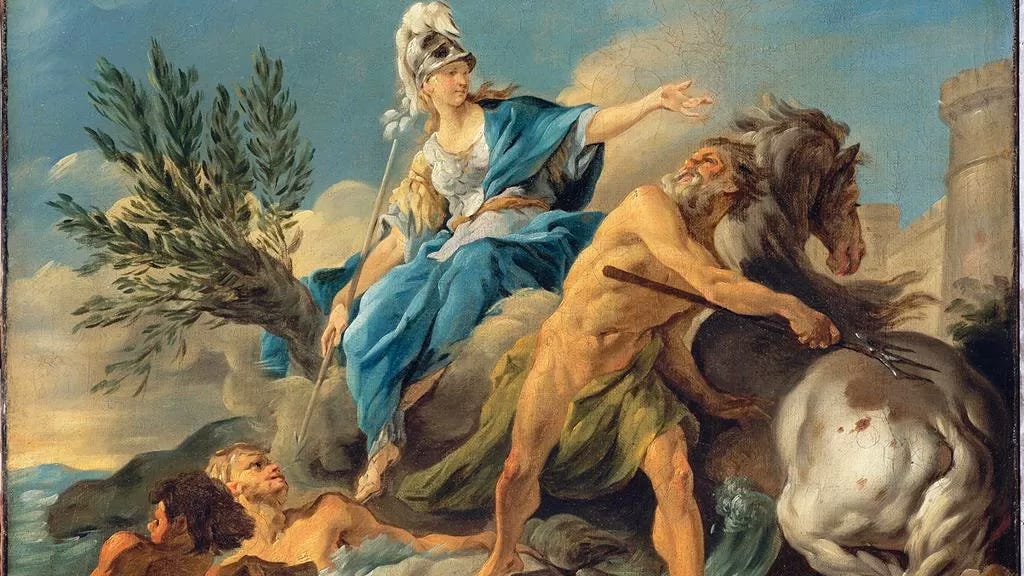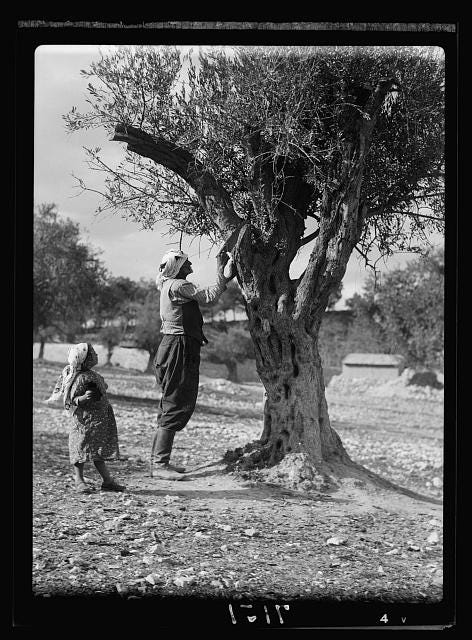Hope and Olives
A story of Palestinian resistance rooted in the resilience of the olive tree.
“If the Olive Trees knew the hands that planted them, their oil would become tears”– Mahmoud Darwish
Olives are a staple of the Mediterranean diet.
But the olive tree is more than just a fruitful plant, the story of the olive tree runs deep and is synonymous with the roots of ancient history, ancestral knowledge, and ecology.
History and symbolism
Where does the story begin? The olive was spread from Syria, Iran and Palestine to the rest of the Mediterranean basin 6,000 years ago. It is among the oldest known cultivated trees in the world - being grown before the written language was invented. Olives have been found in Egyptian tombs from 2,000 years BC. The olive culture was spread to the early Greeks and then Romans. As the Romans extended their domain they brought the olive with them.
In Greek mythology, the olive tree was Athena’s greatest gift to Zeus.
According to the myth, Athena and Poseidon competed to be the patron deity of the city of Athens. Zeus tasked them with presenting a gift to the people of Athens, and the one with the most valuable gift would be chosen.
Poseidon struck a rock with his trident, causing a saltwater spring to gush forth. However, Athena presented an olive tree, which not only provided food and oil but also represented peace, prosperity, and fertility. Impressed by the usefulness and symbolism of the olive tree, Zeus chose Athena as the patron deity of Athens.
Symbolically, olive trees represent a symbol of abundance and peace.
Eventually woven into world religions, the olive branch is a sacred symbol of peace in Judaism, Christianity and Islam.
Several countries also incorporate olive branches into their national emblems. The Flag of the United Nations adopted in 1946 is a world map with two olive branches.
Trees witness everything
The Ancient Olive Tree
The ancient olive tree in Al-Walaja, south of Jerusalem, has witnessed the unfolding of history in the land of Palestine.
The Al-Walaja olive tree is estimated to be up to 5000 years old, making it one of the oldest living things in Palestine. Still alive and growing, it has witnessed both development and destruction since the Romans and beyond.
It has survived the Babylonians, Romans, Byzantines, Crusaders, Ottomans, British, and Israelis.
Salah Abu Ali, caretaker of the mother tree. https://www.atlasobscura.com/articles/world-oldest-olive-trees
The mother tree, with its wrinkly, wide trunk measuring nine meters in diameter, serves as the central support for 22 smaller trunks that have sprouted from its roots. The ancient mother tree has a total diameter of 25 meters.
The shade of the mother olive tree covers an area of 250 square meters, providing ample space for a crowd of several hundred people.
Standing tall at a height of 13 meters, it receives meticulous care from Salah Abu Ali, a 49-year-old man with a grey beard. He treats the tree with the utmost gentleness as if it were his own child or elderly mother. He built a stone wall around it, where he clears away weeds and dirt, and waters it using a hose connected to a nearby spring.
Spending his entire day under the tree's canopy, he engages in conversations with it and perhaps even envisions the countless tales that have been shared in its very place.
Now, the Al-Walaja olive tree is a symbol of resistance. The rest of the village is a shadow of its former self. Most of the village’s residents were forced to flee their homes amidst heavy fighting during the 1948 Arab-Israeli War, in which approximately 750,000 Palestinian Arabs--over 80% of the population in what would become Israel--were expelled or fled from their homes and became refugees in neighbouring states. “In 1948, we came here and slept under the trees,” Ali says. After the dust settled and the demarcation lines were drawn, Al Walaja had lost around 70 percent of its land.
Sustenance and life
Another reason why olive trees represent Palestinian resilience is the fact that the trees are draught-resistant and grow under poor soil conditions. Olive trees live and bear fruit for thousands of years, drawing a parallel to Palestinian history and continuity on the land.
Since Palestine has some of the world’s oldest olive trees, like the Ancient Olive Tree in Al-Walajeh dating back 4,000 or more years, some families have trees that have been passed down to them for many generations.
The olive harvest season in October bears a socio-cultural meaning where families come together to harvest olive trees, bearing respect for their ancestors who had tended to the same trees many years ago.
Trimming Olive Trees in Palestine: https://www.are.na/block/11053307
Beyond their symbolic meaning, olives are a main source of income for around 80,000 Palestinian families. According to UN figures, around 48% of the agricultural land in the West Bank and Gaza is planted with olive trees. Olive trees account for 70% of fruit production in Palestine and contribute around 14% to the Palestinian economy.
Ripping Out Roots
Since 1967, more than 800,000 Palestinian olive trees have been illegally uprooted by the Israeli authority.
These unprecedented attacks are mainly due to the ongoing expansion of settlements in the West Bank, which are encroaching on the livelihood of Palestinian families. Oftentimes these trees are burned in front of the families, violently ending their livelihood.
Overall, more than 2.5 million trees, one-third of which are olive trees, have been uprooted since 1967.
Estimating the average annual productivity of an olive tree to be 70 kilos and the price of olive seeds 1.103 USD/Kilo, Applied Research Institute Jerusalem estimates that the Palestinian economy has lost about 55,133,602 USD since 1967 to 2009.
Calculated attacks and vandalization of trees especially spike during the harvesting season.
Ecology and socialism
Like the systems in a body, all ecological systems are connected, and the destruction of one part negatively impacts all others.
The environmental consequences of the deforestation of olive trees are devastating. The removal of trees is directly linked to irreversible climate change, soil erosion, and a reduction in crops. The perennial, woody bark acts as a carbon sink. According to the International Olive Council, the olive tree absorbs 11 kg of CO2 per litre of olive oil produced.
Uprooting Palestinian olive trees leads to a subsequent increase in food insecurity, aesthetic degradation, and loss of vegetation. All of these have resulted in a catastrophic decline in the livelihood of Palestinians. Israeli courts have failed to provide environmental justice for Palestinians, ultimately further oppressing Palestinian presence in occupied territories.
Around the world, consciousness of the threat to our environment is growing. The majority of solutions on offer, from using efficient light bulbs to biking to work, focus on individual lifestyle changes, yet the scale of the crisis requires far deeper adjustments.
Ecology and Socialism argues that time remains to save humanity and the planet, but only by building social movements for environmental justice that can demand qualitative changes in our economy, workplaces, and infrastructure.
"This adds a new and vigorous voice to the growing awareness that, yes, it is our capitalist system that is ruining the natural foundation of our civilization and threatening the very idea of a future” - Joel Kovel, author of The Enemy of Nature.
The lack of respect and appreciation for the land is costing us both precious human lives and the earth we call home.
The Red Deal: Indigenous Action to Save our Earth claims that:
“no society could ever have an ethical relationship with a place it stole.”
In other words, we, the Indigenous, Black, people of colour, women, migrants, and working people have inherited a climate disaster. We must reclaim our stolen life and destiny and rise together to confront this challenge. Mass movements are essential. Politicians may or may not follow, but we must design, build, and lead this movement with or without them.
In light of the current situation
Following Hamas’ killing of 1,400 Israelis and the capture of roughly 240 hostages on October 7 in response to the ongoing occupation in Gaza, Israel has killed over 15,000 Palestinians. Per the Euro-Med Human Rights Monitor, Israel has dropped over 25,000 tonnes of explosives on the Gaza Strip in the last month—the equivalent of two nuclear bombs.
This horrific violence has come during the peak of the harvest season, which is important both economically and culturally. Farmers have been forced to flee their land from Israeli warplanes, as well as tank fires targeting farmlands. In the West Bank, Israelis have been documented setting fire to Palestinian olive groves before this past month.
Under international law, Israel is the occupying power in Gaza and the West Bank and is obliged to protect all the people there. But Israel doesn’t recognize Palestine as a state and argues Hamas has bases in hospitals and residential areas, making them legitimate military targets.
In an interview with CNN, Queen Rania of Jordan addressed criticisms from those who oppose a ceasefire, explaining that Israel’s bombardment on Gaza is both morally reprehensible and short-sighted:
“The root cause of this conflict is an illegal occupation. It is routine human rights abuses, illegal settlements, and disregard for UN resolutions and international law. If we do not address these root causes, then you can kill the combatants, but you cannot kill the cause…So I think Israel needs to once and for all realize that if it wants its security, the surest route is through peace.”
Throughout history, the olive branch has been a symbol of peace. But peace and liberation must grow together.
A Palestinian farmer shared the following:
“There is a a saying in Arabic that when translated, goes like this: ‘Generations before us planted the olive tree knowing they wouldn’t see the fruit of their labour, but that the generations that followed would reap the harvest of the trees they planted before.’ This is why we continue to plant olive trees. We reap the fruit of what our forefathers planted. It symbolizes the sustainability, the presence and the existence of Palestinians in the land.
When we lose olive trees due to violence from Israeli settlers, it is as if our family has been violated. These trees have been passed down from generations before us, and we have inherited them from our ancestors to care for them.”
The uprooting of generations of olive trees and ancestral ties of family trees are two leaves of the same branch.
As a collective, right now is a critical moment to be educating, raising our consciousness, and amplifying indigenous leaders and peoples. To strive for freedom and put an end to oppressive ways of being.
Our liberation is bound to the liberation of all living things and the planet
From the river to the sea.
Sources
Thank you to for all her research assistance on this topic.
https://www.oliveoilsource.com/info/history-of-the-olive#:~:text=The olive was native to,the written language was invented.
https://jacobin.com/2023/11/west-bank-israeli-settlers-palestinian-olive-trees-violence-occupation
https://atmos.earth/overview-palestine-olive-trees-symbolism-ceasefire/#:~:text=In the Palestinian village of,25 meters into the ground.
https://thisweekinpalestine.com/the-ancient-olive-tree/#:~:text=The ancient olive tree in,oldest living thing in Palestine.
https://thisismold.com/space/farm-systems/the-unseen-as-fertile-ground-for-new-wisdom
http://yris.yira.org/global-issue/6018
https://www.haymarketbooks.org/books/342-ecology-and-socialism
https://viviensansour.com/Palestine-Heirloom
https://www.commonnotions.org/the-red-deal
https://www.palestineremembered.com/Acre/al-Zeeb/Picture86456.html












ahhh 🫶🏼🫶🏼🫶🏼
Loved this!